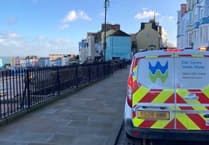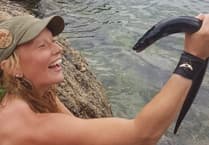Campaigners descended on Aberystwyth over the weekend to highlight the ‘plight of poisoned Welsh rivers’ - and to claim Tesco were ‘main culprits’ for its chicken farming ‘fowl play’.
Activists from Environment Action Talybont, an umbrella group behind the theatrical protests, raised concerns over pollution of the Teifi and the Wye and voiced concerns over plans for a poultry farm near Talybont, which they claim will pollute the river Leri, damaging a rare orchid population.
The small group of protesters called on the Welsh Government to bring in an immediate moratorium on Intensive Poultry Units (IPUs) - which the group says are less like farms and more akin to ‘industrial-sized factories’ that do far more environmental damage.
"Our intention is to raise public awareness of the damage done to our well-being by the huge increase in intensive chicken production," said group member Barry Wise.

"The Wye and its tributaries have one of Europe’s largest concentrations of intensive livestock production," he told spectators. "Forty-five million birds produce vastly more manure than the land can use - phosphates run off into rivers and kill ecosystems."
As the Cambrian News has reported, the Teifi’s health has also been on the radar of authorities for several years, with pollution from harmful substances nitrates and phosphates a particular concern. This is mostly caused by slurry and agricultural run-off.
Ceredigion County Council was compelled into acting after dangerous phosphate levels prompted a total pause of nearly 100 planning applications along the length of the river.
Campaigners, some in chicken costumes, enacted a piece of street theatre to expose Tesco's role in what one called ‘Fowl Play’.
Activist Sarah Reisz said: “Wildlife populations in the Amazon region have declined by a staggering 94 per cent since 1970.
“Forest is cut down to grow Soya to feed intensively farmed animals here and around the world. Brazilian Soya is a key ingredient in chicken feed.”
The villains of the play are Cargill, one of the world's biggest food production companies, and Avara, its Herefordshire subsidiary - which contracts to supply Tesco with cheap chicken as well as many other supermarket firms.
This contract drives a supply chain that causes increasing pollution of our air and water, locally and globally, campaigners say.
"We want people to be alive to the fact that their food purchase choices really matter," she continued.
"And for people to think hard before buying cheap chicken, which is degrading our water and our lives."
Dorothy Wilson, wearing a chicken costume, said "60-70 per cent of the total phosphate load in the Wye catchment now comes from agriculture, that is, IPUs, which are no longer farms, but industrial sized factories.”
Activist John Egan was critical of Anaerobic Digesters, which the poultry industry holds out as a solution to slurry problems.
He referred to an incident at Pencefn Dryscol farm near Tregaron where an estimated 44,000 gallons of animal waste is claimed to have been released into the river in 2016 from one of these digestion plants - without the farm facing any punishment.
After questions from the Cambrian News, the farm recently dismissed claims the Teifi remains exposed to pollution threats from the plant, the leak from which is alleged to have killed an estimated 18,000 fish after the spill.
Geraint John Planning, representing the farm, told the Cambrian News the plant had been redesigned so no repeat pollution incident could occur.
The event was rounded off by a choir performing a version of the spiritual song I went down to the River to Pray.
A Tesco spokesperson said Avara supplies to all major supermarkets and not just Tesco - and added: “Protecting and maintaining water quality and biodiversity in our supply chains is an important priority within our supplier partnerships, and we’re committed to playing our part in ensuring the protection of the River Wye, alongside other actors across the food industry.
“We continue to engage with suppliers and stakeholders across all agricultural sectors in the region as part of the Wye Agri-Food Partnership and have encouraged all of our suppliers to sign up to the Water Roadmap as part of the Courtauld Commitment 2030, which looks to reduce water pollution in key sourcing regions, including the Wye & Usk catchment.
"In partnership with WWF, we have funded some of the work of the Wye & Usk Foundation to tackle water pollution in the area. They work directly with a number of our suppliers on implementing nature-based solutions, including tree planting, as well as supporting farmers to test soils and implement on-farm best practice that all help reduce pollution in the River Wye.”





Comments
This article has no comments yet. Be the first to leave a comment.